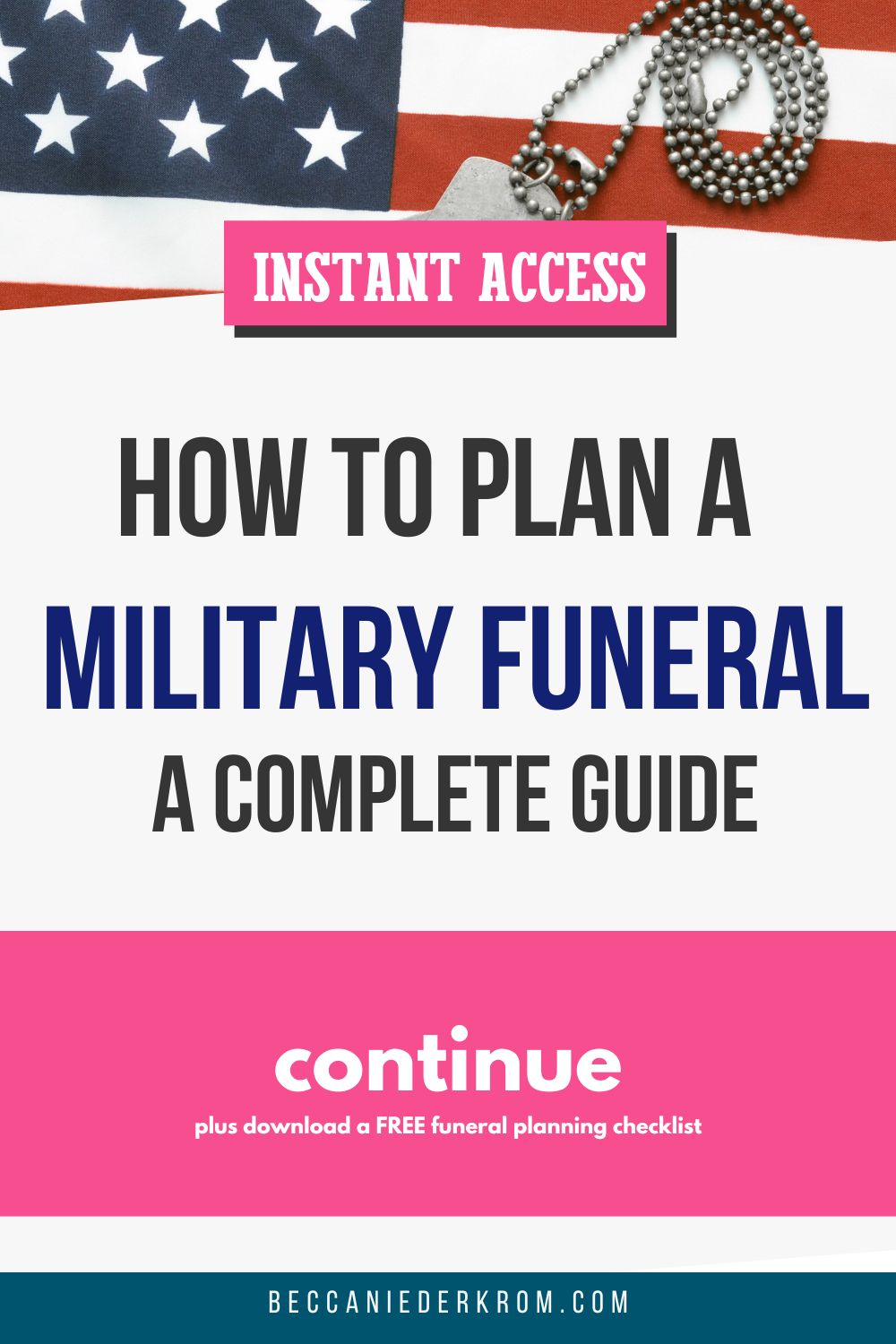We may earn money or products from the companies mentioned in this post. As an Amazon Associate I earn from qualifying purchases. Disclosure of Material Connection: Some of the links in this post may be "affiliate links." This means if you click on the link and purchase an item, I will receive an affiliate commission.
As we honor the sacrifices of our nation’s veterans, planning a military funeral and knowing how to plan a military funeral is a profound way to pay tribute to their service and dedication. This solemn ceremony not only acknowledges their contributions but also provides a dignified farewell that reflects their commitment to our country. For families navigating this process, understanding the steps involved in planning a military funeral is crucial. From confirming eligibility for military honors to coordinating with funeral homes and accessing VA benefits, each detail matters in creating a meaningful and respectful tribute. This comprehensive guide will walk you through the essential steps and considerations for planning a military funeral, ensuring that your loved one receives the recognition they deserve.
How to Plan a Military Funeral: A Complete Guide for Families
Planning a military funeral is a profound way to honor a veteran’s service and sacrifice. This comprehensive guide will walk you through the process, ensuring you can create a meaningful tribute that respects your loved one’s military legacy.

Understanding Military Funeral Honors
Military funeral honors are ceremonial gestures provided by the United States Armed Forces to recognize the service of veterans. These honors typically include:
- The playing of “Taps”
- Folding and presentation of the American flag to the next of kin
- A detail of at least two uniformed military personnel
Eligibility for Military Funeral Honors
Before planning a military funeral, it’s crucial to confirm eligibility. Generally, those eligible include:
- Veterans who served in the active military and were discharged under conditions other than dishonorable
- Members of the Selected Reserve
- Former members of the Selected Reserve who served at least one term of enlistment or period of initial obligated service
To confirm eligibility, you’ll need the veteran’s DD Form 214 (Certificate of Release or Discharge from Active Duty).
Steps to Plan a Military Funeral
1. Gather Necessary Documents
The first step in planning a military funeral is to gather essential documents, including:
- DD Form 214
- Death certificate
- Burial or cremation permit
- Veterans Affairs (VA) claim number (if applicable)
[download funeral planning checklist here]
2. Choose a Funeral Home
Select a funeral home experienced in handling military funerals. The funeral director can be instrumental in coordinating with military personnel for honors.
3. Decide on Burial Location
Veterans have several options for their final resting place:
- VA national cemeteries
- State veterans cemeteries
- Private cemeteries
If choosing a VA national cemetery, contact the National Cemetery Scheduling Office at 800-535-1117 to arrange the burial.
4. Request Military Funeral Honors
Your funeral director can help arrange military honors, or you can contact the appropriate military branch directly:
- Army: 888-276-9472
- Navy: 800-326-9631
- Air Force: 800-586-8402
- Marine Corps: Contact the local Marine Corps Reserve Center
- Coast Guard: Contact the local Coast Guard unit
Request honors at least 48 hours before the funeral service.
5. Arrange for a Burial Flag
A United States flag is provided at no cost to drape the casket or accompany the urn of a deceased veteran. You can obtain this flag from a VA regional office or most U.S. Post Offices. Add to this display case.
6. Consider Additional Elements
While not part of the standard military honors, you may want to include:
- A rifle volley (often mistakenly called a “21-gun salute”)
- Military or veteran service organization color guard
- Military chaplain services
What to Expect During the Military Funeral
Arrival at the Cemetery
Upon arrival, you’ll likely see uniformed personnel standing at attention. The hearse will pass them slowly as they salute.
The Committal Service
The service typically takes place at a committal shelter, not at the gravesite, and lasts about 20 minutes. Family members may choose to have readings or clergy present.
Military Honors Ceremony
After any personal or religious elements, the military honors will be rendered. This includes:
- Playing of “Taps”
- Folding of the American flag
- Presentation of the flag to the next of kin
If additional elements like a rifle volley are included, they will typically occur before the playing of “Taps.”
Flag Presentation
A member of the honor guard will present the folded flag to the next of kin with the following words:
“On behalf of the President of the United States, (the United States Army, Navy, Air Force, Marine Corps or Coast Guard), and a grateful nation, please accept this flag as a symbol of our appreciation for your loved one’s honorable and faithful service.”
Burial Benefits from the VA
The VA provides several burial benefits for eligible veterans:
For Burials in a National Cemetery
- Gravesite
- Opening and closing of the grave
- Perpetual care
- Government headstone or marker
- Burial flag
- Presidential Memorial Certificate
For Burials in a Private Cemetery
- Government headstone or marker
- Burial flag
- Presidential Memorial Certificate
Burial Allowances
The VA offers burial allowances to partially reimburse the burial and funeral costs of eligible veterans. As of 2025, these allowances include:
- Service-connected death: Up to $2,000
- Non-service-connected death: Up to $796 for burial and funeral expenses
- Plot allowance: Up to $796
Planning the Non-Military Aspects of the Funeral
While military honors are a significant part of a veteran’s funeral, there are other elements to consider:
Personalization
Incorporate personal touches that reflect the veteran’s life and personality:
- Display of medals and awards
- Photo collages or video tributes
- Reading of favorite poems or passages
Music
In addition to “Taps,” consider including other meaningful music:
- Patriotic songs
- Service branch hymns
- Personal favorites of the deceased
Eulogy
Craft a eulogy that honors both the veteran’s military service and their civilian life. Include:
- Stories from their time in service
- Accomplishments and contributions to their community
- Personal anecdotes that capture their character
Reception
Plan a gathering after the funeral where friends and family can share memories and support each other. Consider incorporating:
- A memory book for guests to write in
- A display of military memorabilia
- The veteran’s favorite foods or drinks
Coping with Grief While Planning
Planning a funeral while grieving can be overwhelming. Here are some tips to help:
- Accept help from family and friends
- Take breaks when needed
- Consider grief counseling or support groups
- Remember that it’s okay to delegate tasks
FAQs About Military Funerals
Q: Can veterans be buried in Arlington National Cemetery?
A: Eligibility for burial at Arlington is more restricted than at other national cemeteries. Generally, it’s limited to active duty service members, retired military members, and certain veterans and family members.
Q: What if the DD Form 214 is lost?
A: You can request a copy from the National Personnel Records Center or submit an emergency request if the funeral is imminent.
Q: Can non-veterans receive military funeral honors?
A: Military funeral honors are generally reserved for veterans and active duty service members. However, some exceptions exist for certain civilian employees of the military.
Q: Is there a cost for military funeral honors?
A: No, military funeral honors are provided free of charge for eligible veterans.
Q: Can I request a specific branch of service for the honor guard?
A: Yes, you can request that the honor guard be from the veteran’s branch of service.
Honoring Service and Sacrifice
Planning a military funeral is a final act of love and respect for a veteran. By understanding the process and available benefits, you can create a meaningful tribute that honors your loved one’s service to our country.
Remember, while the military elements are important, the most meaningful aspects of the funeral will be the personal touches that celebrate the unique life of your veteran. Take the time to reflect on their service, their accomplishments, and the impact they had on those around them.
As you navigate this challenging time, don’t hesitate to lean on the support of family, friends, and professionals. The funeral director, VA representatives, and military personnel are there to assist you in creating a dignified and respectful farewell.
By carefully planning each aspect of the military funeral, you’re not only honoring your loved one but also providing comfort and closure for those left behind. It’s a final salute to a life of service, sacrifice, and dedication – a tribute that will be remembered by all who attend.

